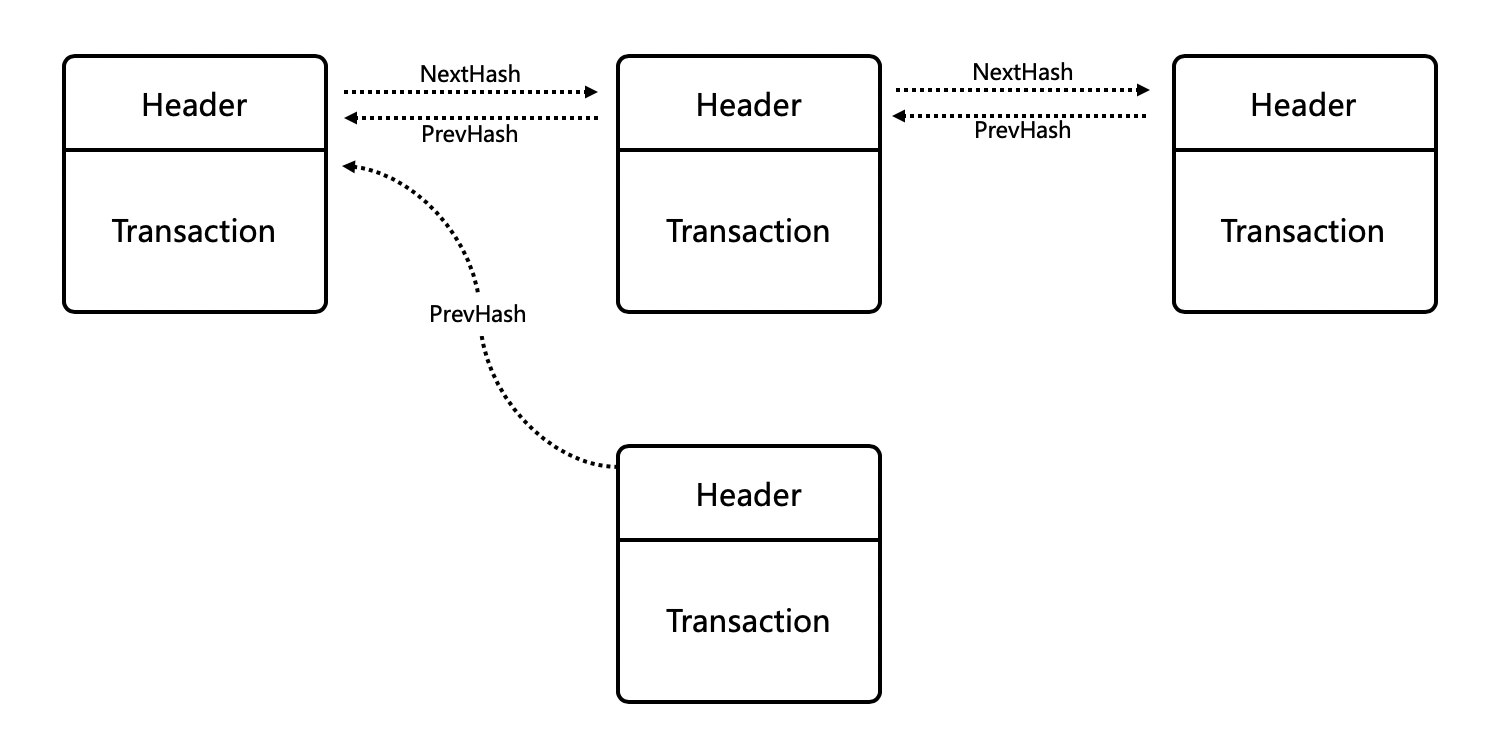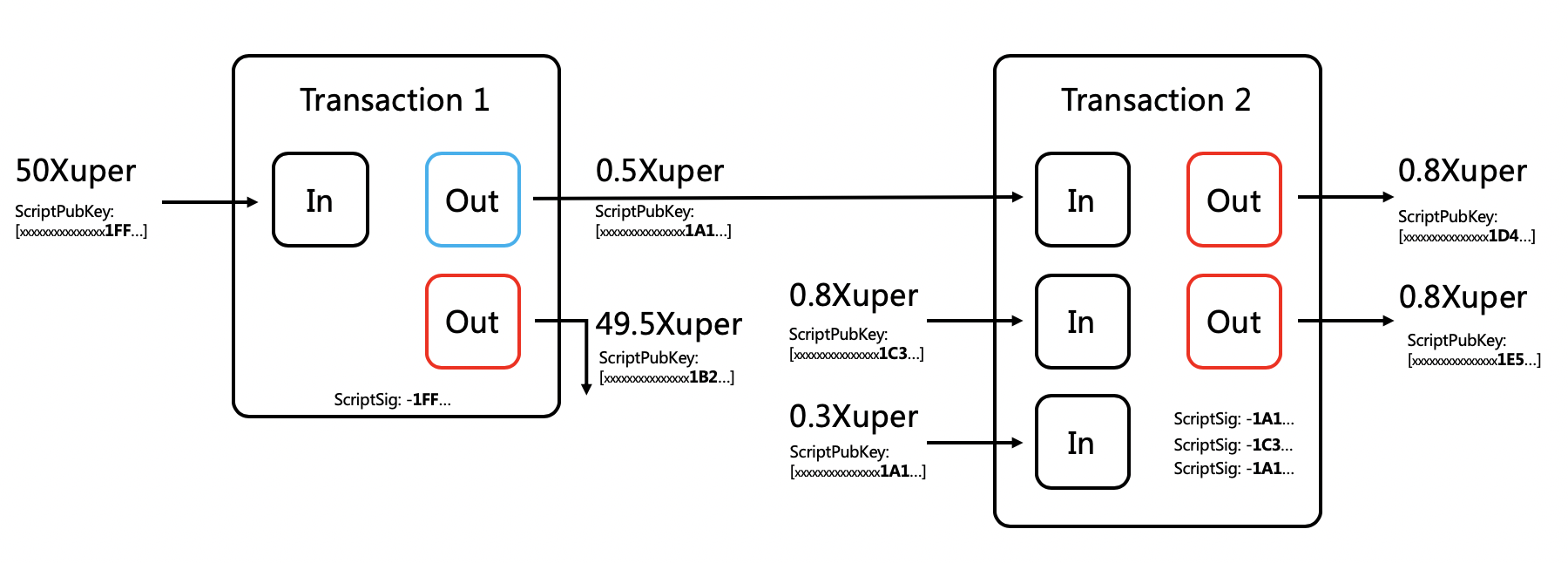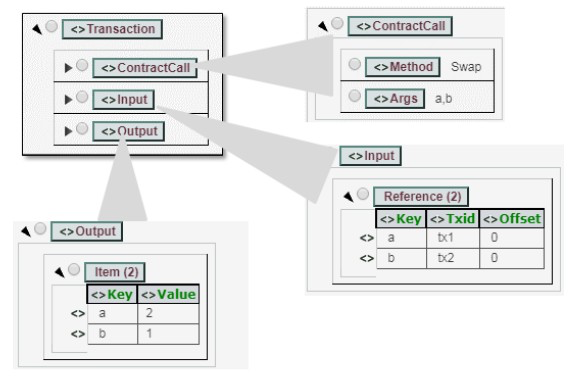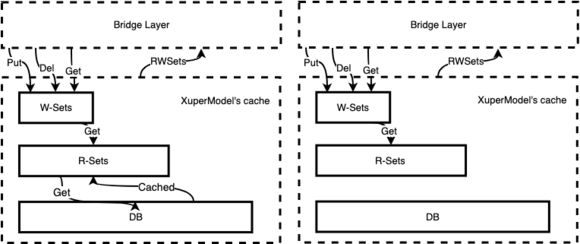5. 账本状态机¶
众所周知,程序=数据结构+算法,了解一个程序的数据结构有助于掌握一个程序的关键设计。本文从背景、功能以及各个字段的用意来剖析XuperChain底层账本的核心数据结构,从而方便XuperChain开发者以及用户更深入地了解XuperChain底层框架的核心数据结构的设计缘由,有助于提高XuperChain开发者更高效的开发,有助于XuperChain用户更好的使用XuperChain来服务自己的业务。
5.1. 核心数据结构¶
涉及到账本的核心数据结构包括:区块、交易、UTXO、读写集。
5.1.1. 区块¶
背景:所谓区块链,简单来说就是不同的区块以DAG方式链接起来形成的链。因此,区块是区块链的基本单元。
功能:区块是区块链的基本单元,通常为了提高区块链网络的吞吐,矿工会在一个区块中打包若干个交易。一个区块通常由区块头以及区块体组成。

代码:区块的Proto如下
1 2 3 4 5 6 7 8 9 10 11 12 13 14 15 16 17 18 19 20 21 22 23 24 25 26 27 28 29 30 31 32 33 34 35 36 37 38 39 40 41 42 43 44 45 46 47 48 49 50 51 52 53 54 55 | message InternalBlock {
// block version
// 区块版本
int32 version = 1;
// Random number used to avoid replay attacks
// 随机数,用来避免重放攻击
int32 nonce = 2;
// blockid generate the hash sign of the block used by sha256
// 区块的唯一标识
bytes blockid = 3;
// pre_hash is the parent blockid of the block
// 区块的前置依赖区块ID
bytes pre_hash = 4;
// The miner id
// 矿工ID
bytes proposer = 5;
// 矿工对区块的签名
// The sign which miner signed: blockid + nonce + timestamp
bytes sign = 6;
// The pk of the miner
// 矿工公钥
bytes pubkey = 7;
// The Merkle Tree root
// 默克尔树树根
bytes merkle_root = 8;
// The height of the blockchain
// 区块所在高度
int64 height = 9;
// Timestamp of the block
// 打包区块的时间戳
int64 timestamp = 10;
// Transactions of the block, only txid stored on kv, the detail information
// stored in another table
// 交易内容
repeated Transaction transactions = 11;
// The transaction count of the block
// 区块中包含的交易数量
int32 tx_count = 12;
// 所有交易hash的merkle tree
repeated bytes merkle_tree = 13;
// 采用DPOS共识算法时,当前是第几轮
int64 curTerm = 16;
int64 curBlockNum = 17;
// 区块中执行失败的交易以及对应的失败原因
map<string, string> failed_txs = 18; // txid -> failed reason
// 采用POW共识算法时,对应的挖矿难度值
int32 targetBits = 19;
// 下面的属性会动态变化
// If the block is on the trunk
// 该区块是否在主干上
bool in_trunk = 14;
// Next next block which on trunk
// 当前区块的后继区块ID
bytes next_hash = 15;
}
|
5.1.2. 交易¶
背景:区块链网络中的每个节点都是一个状态机,为了给每个节点传递状态,系统引入了交易,作为区块链网络状态更改的最小操作单元。
功能:通常表现为普通转账以及智能合约调用。
代码:交易的Proto如下
1 2 3 4 5 6 7 8 9 10 11 12 13 14 15 16 17 18 19 20 21 22 23 24 25 26 27 28 29 30 31 32 33 34 35 36 37 38 39 40 41 42 43 44 45 46 47 48 49 50 | message Transaction {
// txid is the id of this transaction
// 交易的唯一标识
bytes txid = 1;
// the blockid the transaction belong to
// 交易被打包在哪个区块中
bytes blockid = 2;
// Transaction input list
// UTXO来源
repeated TxInput tx_inputs = 3;
// Transaction output list
// UTXO去处
repeated TxOutput tx_outputs = 4;
// Transaction description or system contract
// 交易内容描述或系统合约
bytes desc = 6;
// Mining rewards
// 矿工奖励
bool coinbase = 7;
// Random number used to avoid replay attacks
// 随机数
string nonce = 8;
// Timestamp to launch the transaction
// 发起交易的时间戳
int64 timestamp = 9;
// tx format version; tx格式版本号
int32 version = 10;
// auto generated tx
// 该交易是否属于系统自动生成的交易
bool autogen = 11;
// 读写集中的读集
repeated TxInputExt tx_inputs_ext = 23;
// 读写集中的写集
repeated TxOutputExt tx_outputs_ext = 24;
// 该交易包含的合约调用请求
repeated InvokeRequest contract_requests = 25;
// 权限系统新增字段
// 交易发起者, 可以是一个Address或者一个Account
string initiator = 26;
// 交易发起需要被收集签名的AddressURL集合信息,包括用于utxo转账和用于合约调用
repeated string auth_require = 27;
// 交易发起者对交易元数据签名,签名的内容包括auth_require字段
repeated SignatureInfo initiator_signs = 28;
// 收集到的签名
repeated SignatureInfo auth_require_signs = 29;
// 节点收到tx的时间戳,不参与签名
int64 received_timestamp = 30;
// 统一签名(支持多重签名/环签名等,与initiator_signs/auth_require_signs不同时使用)
XuperSignature xuper_sign = 31;
}
|
5.1.3. UTXO¶
背景:区块链中比较常见的两种操作,包括普通转账以及合约调用,这两种操作都涉及到了数据状态的引用以及更新。为了描述普通转账涉及到的数据状态的引用以及更新,引入了UTXO(Unspent Transaction Output)。
功能:一种记账方式,用来描述普通转账时涉及到的数据状态的引用以及更新。通常由转账来源数据(UtxoInput)以及转账去处数据(UtxoOutput)组成。

代码:UTXO的Proto如下
1 2 3 4 5 6 7 8 9 10 11 12 13 14 15 16 17 18 19 20 21 22 23 24 25 26 27 28 29 30 31 32 33 34 35 36 37 38 39 40 41 42 43 44 45 46 | message Utxo {
// 转账数量
bytes amount = 1;
// 转给谁
bytes toAddr = 2;
// 转给谁的公钥
bytes toPubkey = 3;
// 该Utxo属于哪一个交易
bytes refTxid = 4;
// 该Utxo数据哪一个交易的哪一个offset
int32 refOffset = 5;
}
// UtxoInput query info to query utxos
// UTXO的转账来源
message UtxoInput {
Header header = 1;
// which bcname to select
// UTXO来源属于哪一条链
string bcname = 2;
// address to select
// UTXO来源属于哪个address
string address = 3;
// publickey of the address
// UTXO来源对应的公钥
string publickey = 4;
// totalNeed refer the total need utxos to select
// 需要的UTXO总额
string totalNeed = 5;
// userSign of input
// UTXO来源的签名
bytes userSign = 7;
// need lock
// 该UTXO是否需要锁定(内存级别锁定)
bool needLock = 8;
}
// UtxoOutput query results
// UTXO的转账去处
message UtxoOutput {
Header header = 1;
// utxo list
// UTXO去处
repeated Utxo utxoList = 2;
// total selected amount
// UTXO去处总额
string totalSelected = 3;
}
|
5.1.4. 读写集¶
背景:区块链中比较常见的两种操作,包括普通转账以及合约调用,这两种操作都涉及到了数据状态的引用以及更新。为了描述合约调用涉及到的数据状态的引用以及更新,引入了读写集。
功能:一种用来描述合约调用时涉及到的数据状态的引用以及更新的技术。通常由读集(TxInputExt)以及写集(TxOutputExt)组成。

代码:读写集的Proto如下
1 2 3 4 5 6 7 8 9 10 11 12 13 14 15 16 17 18 19 20 | // 扩展输入
message TxInputExt {
// 读集属于哪一个bucket
string bucket = 1;
// 读集对应的key
bytes key = 2;
// 读集属于哪一个txid
bytes ref_txid = 3;
// 读集属于哪一个txid的哪一个offset
int32 ref_offset = 4;
}
// 扩展输出
message TxOutputExt {
// 写集属于哪一个bucket
string bucket = 1;
// 写集对应的key
bytes key = 2;
// 写集对应的value
bytes value = 3;
}
|
5.2. XuperModel¶
XuperChain能够支持合约链内并行的很大的原因是由于其底层自研的XuperModel数据模型。
XuperModel是一个带版本的存储模型,支持读写集生成。该模型是比特币utxo模型的一个演变。在比特币的utxo模型中,每个交易都需要在输入字段中引用早期交易的输出,以证明资金来源。同样,在XuperModel中,每个事务读取的数据需要引用上一个事务写入的数据。在XuperModel中,事务的输入表示在执行智能合约期间读取的数据源,即事务的输出来源。事务的输出表示事务写入状态数据库的数据,这些数据在未来事务执行智能合约时将被引用,如下图所示:

XuperModel事务¶
为了在运行时获取合约的读写集,在预执行每个合约时XuperModel为其提供智能缓存。该缓存对状态数据库是只读的,它可以为合约的预执行生成读写集和结果。验证合约时,验证节点根据事务内容初始化缓存实例。节点将再次执行一次合约,但此时合约只能从读集读取数据。同样,写入数据也会在写入集中生效。当验证完生成的写集和事务携带的写集一致时合约验证通过,将事务写入账本,cache的原理如下所示,图中左边部分是合约预执行时的示意图,右边部分是合约验证时的示意图:

XuperModel合约验证¶
